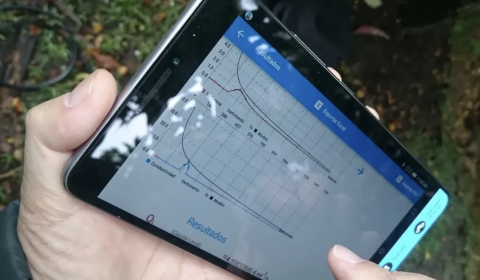CleantechHUB helps Colombia’s climate entrepreneurs attract funds
CleantechHUB helps Colombia’s climate entrepreneurs attract funds
In Colombia, green business accelerator, CleantechHUB, is providing a platform for entrepreneurs to develop and present their sustainable business ideas, to raise capital and create green jobs. This story is part of a series celebrating the locally-led solutions supported by the UNDP implemented - Adaptation Fund Climate Innovation Accelerator programme.
Precision technologies to monitor water and soil conditions will soon be accessible to Colombians hoping to adopt climate-smart farming and water management practices.
These technologies are being brought to the local market by Lynks and Fluvia, which represent just two of the start-ups growing in Colombia’s climate adaptation economy, thanks to green business accelerator CleantechHUB.
Gideon Blaauw, CleantechHUB’s National Lead in Colombia, says the organisation’s main goal is to foster climate entrepreneurship, which means helping start-ups that want to make a positive environmental impact.
While Fluvia offers chemical tracers, equipment and an app that allows one to monitor water quality in rivers and dams in real-time, the LYNKBOX® platform from Lynks enables one to fine-tune farm irrigation systems by live-tracking parameters like water flow rates, temperature and humidity.
Blaauw says his team works with start-ups and various stages of development. From the moment an entrepreneur conceives a green business idea to the critical stages of raising capital and scaling up operations, CleantechHUB is there as a dedicated partner, he says.
Their approach is not one of "top-down" instruction, but rather one of collaboration and facilitation. Blaauw says they are an international team, working together with a global perspective to identify and build on innovative solutions.
"We train them in capacity building. Then after the training, we try to help connect them to their markets, to a potential buyer of the products, or to the capital markets.”
However, the biggest barriers in their work are communicating the highly technical ideas behind many climate adaptation businesses to potential investors, as well as linking academic research to real-world applications.
“We try to take away the barriers that start-ups face, like attracting capital to new technologies,” he says. “It’s very difficult if you cannot explain things to the person on the other side of the table.”
“Most of our startups are by engineers and they sit across the table from a banker who does not know anything about engineering and vice versa. A lot of the time, we are in the middle; we help validate their business model and that for funders is very valuable," says Blaauw.
The global green business accelerator is helping hundreds of startups across the world to raise capital and create green jobs, but the Colombian hub is special because, says Blaauw, they’ve been able to access grant money from the UNDP-Adaptation Fund Climate Innovation Accelerator (AFCIA).
UNDP-AFCIA accelerates innovative technologies, practices and business models for local adaptation by tapping into the incredible potential of NGOs, civil society, women and young innovators.

“UNDP is traditionally not known for being an organisation that is very accessible to tiny organisations like ourselves, and with the UNDP-AFCIA programme they are breaking away from that, which is a huge deal for us. We hope that UNDP continues with the AFCIA work because it's so crucial to get this thing going,” says Blaauw.
The grant funds supported their Climathon and ClimateLaunchpad programmes, which provide platforms for entrepreneurs to develop and present their sustainable business ideas.
“The Colombia ClimAccelerator has helped companies like Lynks and Fluvia scale their operations,” says Blaauw. “By offering resources, mentorship, and support programmes, CleantechHUB is instrumental in enhancing the reach and effectiveness of such climate entrepreneurs who are driving sustainable change and innovation in precision agriculture.”
He says their mission ultimately is to reach even more start-ups. “Over the past couple of years we’ve accompanied a couple of hundred startups, which is great and we’re very happy we did it, but over the next couple of years we want to be able to support a couple of thousand startups,” he says.
“If we can get 10 times our support, we for sure know that we can make 10 times the climate impact being delivered by them."
Blaauw adds that they measure success through tangible environmental impact. Their metrics include assessing whether startups achieve self-sustainability, create green jobs, deliver positive climate benefits, and attract green finance.
Lynks, for instance, serves sugar, rice, palm and other growers, as well as irrigation districts and environmental corporations, says Blaauw. “Testimonials from their clients highlight the practicality and effectiveness of Lynks' systems in managing water usage and improving crop development with less water,” he explains.
Finally, Blaauw notes that many of the start-ups they work with also have female founders and co-founders. “Our latest batch of startups in our acceleration programme are 40% women-led, and we’ve been working with another funder on how we can involve more women in our programmes."
About this article:
This story has been co-created with the support of CleantechHUB, UNDP, CDKN, ICCCAD, and GRP, under the framework of the UNDP-managed Adaptation Fund Climate Innovation Accelerator (AFCIA).
The UNDP-AFCIA programme counts on financial contributions from the Adaptation Fund and the European Union and has awarded 44 micro and small grants to locally-led organisations across 33 countries worldwide, accelerating their innovative solutions to build resilience in the most vulnerable communities.
UNDP-AFCIA, is one of the funding windows anchored under the Adaptation Innovation Marketplace (AIM), a multi-stakeholder strategic platform that promotes scaled-up adaptation at the local level, launched by UNDP Administrator Achim Steiner at the Climate Adaptation Summit in January 2021.
